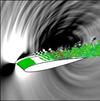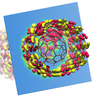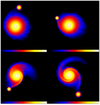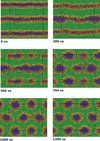NGCM

Next Generation Computational Modelling (NGCM)
The Centre for Doctoral Training in Next Generation Computational Modelling brings together world-class simulation modelling research activities from across the University of Southampton and hosts a 4-year doctoral training programme that is the first of its kind in the UK, and studentships are available.
Computational Modelling
Computational modelling is emerging as a "third pillar" of science and engineering alongside theory and experimentation. Computer simulations bridge between theory and experiment, generating hypotheses, forecasts and predictions about real-world systems. This reduces the number of experiments that need to be carried out in the real world and the number of design prototypes that have to be built, thereby reducing cost, encouraging innovation, optimising system design and enabling the study of systems for which experimental work is infeasible (for example due to prohibitive cost or risk of endangering lives, the environment, etc).
As a consequence of this increasingly key role, computational modelling is now recognised as a priority area by industry, government and science itself.
For queries about this topic, contact Hans Fangohr.
View the calendar of events relating to this topic.
Projects

Advanced simulation tools for prediction of flash-back in hydrogen-rich gas turbine combustion
Edward Richardson (Investigator), James Bailey
The project involves the numerical simulation of hydrogen-rich flows using Direct Numerical Simulation (DNS) and Large Eddy simulations. Hydrogen rich fuels offer the opportunity to reduce the carbon intensity of energy supply. Hydrogen-rich fuels and other low-carbon energy sources are expect to become increasingly important in this regard. Hydrogen is more reactive and diffusive than conventional hydrocarbon fuels requiring advanced computational methods to optimise the use of these fuels in gas turbines.

Agent-Based Modelling of High Frequency Traders
Frank McGroarty, Enrico Gerding (Investigators), Alvaro Perez-Diaz
Agent-Based Modelling of High Frequency Traders

Centre for Doctoral Training in Next Generation Computational Modelling
Hans Fangohr, Ian Hawke, Peter Horak (Investigators), Susanne Ufermann Fangohr, Thorsten Wittemeier, Kieran Selvon, Alvaro Perez-Diaz, David Lusher, Ashley Setter, Emanuele Zappia, Hossam Ragheb, Ryan Pepper, Stephen Gow, Jan Kamenik, Paul Chambers, Robert Entwistle, Rory Brown, Joshua Greenhalgh, James Harrison, Jonathon Waters, Ioannis Begleris, Craig Rafter
The £10million Centre for Doctoral Training was launched in November 2013 and is jointly funded by EPSRC, the University of Southampton, and its partners.
The NGCM brings together world-class simulation modelling research activities from across the University of Southampton and hosts a 4-year doctoral training programme that is the first of its kind in the UK.

Challenging Topological Prejudice - Automated Airframe Layout Design
Andras Sobester (Investigator), Paul Chambers
Aircraft preliminary design scopes are drastically narrowed by topological prejudice. Modern aircraft have settled on the same 'tube plus wing and cruciform tail' type topology that has been adopted through their ancestry, with no scientific evidence that this layout is optimal. This research project poses the question:
“Given a topologically flexible aircraft geometry that is free of prejudice or bias, would a sophisticated multi-disciplinary optimization process yield a conventional layout?”

Coupled multi-scale simulation of high Reynolds number airfoil flows
Neil Sandham, Nicola De Tullio (Investigators), David Lusher
Application of multi-scale nested direct numerical simulations to high Reynolds number aerofoil flows.

Deep Optimisation
Jamie Caldwell
The project will develop the implementation and application of a new optimisation technique. 'Deep optimisation' combines deep learning techniques in neural networks with distributed optimisation methods to create a dynamically re-scalable optimisation process. This project will develop this technique to better-understand its capabilities and limitations and develop GPU implementations. The protein structure prediction problem will be used as the main test application.

Design of Unmanned Air Vehicles
James Scanlan (Investigator), Robert Entwistle
Using computational modelling of a 3D airspace simulation environment to meet the safety and collision-avoidance requirements of the certification authorities.

Developing programming skills with Minecraft and Python
Hans Fangohr (Investigator), Alvaro Perez-Diaz
PythonTool is a Minecraft mod created for this project which allows interactive execution of Python scripts which interact with the game in real time. It intends to make teaching programming to children or non-expert users easier and more appealing.

DIPLOS - Dispersion of Localised Releases in a Street Network
Trevor Thomas, Ian Castro (Investigators)
The security threat level from international terrorism, introduced by the UK Security Service, has been classified as either "severe" or "critical" for much of its six-year history, and currently remains as "substantial" (source: MI5 website). Part of the risk posed by terrorist threats involves potential releases of air-borne chemical, biological, radiological or nuclear (CBRN) material into highly populated urbanised areas. Smoke from industrial accidents within or in the vicinity of urban areas also pose risks to health and can cause widespread disruption to businesses, public services and residents. The Buncefield depot fire of 2005 resulted in the evacuation of hundreds of homes and closure of more than 200 schools and public buildings for two days; consequences would have been much more severe if prevailing meteorological conditions had promoted mixing or entrainment of the smoke plume into the urban canopy. In both these scenarios it is crucial to be able to model, quickly and reliably, dispersion from localised sources through an urban street network in the short range, where the threat to human health is greatest. However, this is precisely where current operational models are least reliable because our understanding and ability to model short-range dispersion processes is limited. The contribution that DIPLOS will make is:
1. to fill in the gaps in fundamental knowledge and understanding of key dispersion processes,
2. to enable these processes to be parametrized for use in operational models,
3. to implement them into an operational model, evaluate the improvement and apply the model to a case study in central London
Most of the existing research on urban dispersion has focused on air quality aspects, with sources being extensive and distributed in space. Scientifically, this research is novel in focusing on localized releases within urban areas, and on dispersion processes at short range. Through a combination of fundamental studies using wind tunnel experiments and high resolution supercomputer simulations, extensive data analysis and development of theoretical and numerical models, DIPLOS will contribute to addressing this difficult and important problem from both a scientific research and a practical, operational perspective.

Dispersion of Small Inertial Particles in Characteristic Atmospheric Boundary Layer Flows
Zheng-Tong Xie (Investigator), Thorsten Wittemeier
This project aims at improving the near-field accuracy of short term predictions of the dispersion of particulate matter in the atmospheric boundary layer. For this purpose a variety of LES and DNS modelling approaches is used.

Dynamics simulations for quantum feedback to steer a single-particle harmonic oscillator in non-classical states
Hendrik Ulbricht (Investigator), Ashley Setter
This PhD project is about using digital electronics to implement a parametric feedback loop to modulate the intensity of an optical trapping laser in order to stabilise/cool the centre of mass motion of a nanoparticle. It is then intended we use digital parametric feedback to drive the motion of the particle, which is essentially a quantum harmonic oscillator, into non-classical quantum states such as squeezed and number states.

Fidelity optimisation in an atomic quantum computer
Timothy Freegarde (Investigator), Jack Saywell
Development of optimised composite pulses for atomic quantum computers with the aim of reducing systematic errors in information processing caused by variations in laser intensity and environment.

Integrating Automated Vehicles into the Transport Network
Bani Anvari, Ben Waterson (Investigators), Craig Rafter
Innovative new designs to transportation infrastructure - with a strong evidence base - that will support automated vehicles to maximize sustainability in the transport network.

Large-Scale Quantum Chemistry Simulations of Organic Photovoltaics
Chris-Kriton Skylaris (Investigator), Gabriele Boschetto
The aim of this project is to use first principles quantum mechanical calculations to provide a detailed atomic-level understanding of OPV materials and models of bulk heterojunctions on a far larger scale than possible before by using the ONETEP program for linear-scaling first principles quantum mechanical calculations.

Lattice Holographic Cosmology
Andreas Juttner (Investigator), Matthew Mostert
This project will aim to develop new theoretical field methods and massively parallel computational algorithms to be utilised on both new computational architectures (e.g. Intel Xeon Phi) and existing high performance computers (HPCs).
The ultimate goal is to make predictions for the power spectrum and non-gaussianties of the CMB which would then be falsifiable by comparison to the Planck and WMAP data.

Lattice Holographic Cosmology
This project will aim to develop new theoretical field methods and massively parallel computational algorithms to be utilised on both new computational architectures (e.g. Intel Xeon Phi) and existing high performance computers (HPCs).

Mathematical tools for analysis of genome function, linkage disequilibrium structure and disease gene prediction
Andrew Collins, Mahesan Niranjan, Reuben Pengelly (Investigators), Alejandra Vergara Lope
This iPhD project uses a Gaussian Bayesian Networks approaches framework through machine learning approach to predict which genes are involved in the development of different diseases.

Mathematical tools for analysis of genome function, linkage disequilibrium structure and disease gene prediction
Mahesan Niranjan, Andrew Collins, Reuben Pengelly (Investigators)
This iPhD project uses a Gaussian Bayesian Networks framework through Machine learning methods to predict which genes are involved in the development of different diseases.

Mathematical tools for analysis of genome function, linkage disequilibrium structure and disease gene prediction
Mahesan Niranjan, Andrew Collins, Reuben Pengelly (Investigators)
This PhD project uses a Monte Carlo molecular simulation processes approach to predict which genes are involved in the development of different diseases.

Microstructural modeling of skin mechanics
Georges Limbert (Investigator), Emanuele Zappia
Microstructural modeling of skin mechanics to gain a mechanistic insight into the biomechanics of the skin.

Modelling of neutron star interactions in X-ray binary systems
Malcolm Coe (Investigator), Rory Brown
Investigating the X-ray production mechanisms of binaries containing neutron stars and the decretion disks of Be stars using Smoothed Particle Hydrodynamics (SPH).
Multi-Scale Modelling of Composite Riser Systems
Adam Sobey (Investigator), Hossam Ragheb
There is an ever increasing interest in exploiting ocean resources at greater depths. At these depths composite materials have a larger separation, in terms of benefits, from traditional steel structures as they offer lower maintenance costs, low weight and high durability. However, there are limited current examples of using composites for these applications meaning that empirical knowledge and specific computational tools are limited. As an example of this lack of knowledge current design guidance gives fatigue safety factors in a range of 15-50. Development of more accurate computational tools will allow an increase in safety and/or reduction of the structure.
A key aspect to increasing the usage of flexible composite risers is the ability to assess the reliability of such structures. Importance Sampling Simulation is becoming the preferred method to assess structures which ideally requires a fast and accurate structural modelling method. Whilst Finite Element Methods can provide an accurate solution to these problems they are slow to run. It is therefore proposed to investigate the use of multiscale modelling to investigate the reliability of such structures. This will involve the development of: a full-scale model to be run in conjunction with fluid mechanics simulations, a higher resolution model to investigate the fatigue hotspot near the seabed and a more local model to simulate the fatigue growth.

Multimode simulation of high power fibre lasers and amplifiers
Peter Horak (Investigator), Ioannis Begleris
This project aims to address the challenge of ever-increasing demand for higher powers from fibre lasers by developing theoretical and numerical methods to simulate laser pulse amplification in large-mode area fibres supporting multiple spatial modes.

Multiscale models of magnetic materials at elevated temperatures
Denis Kramer (Investigator), Jonathon Waters
This project will develop and apply multi-scale modelling approaches to investigate thermal fluctuation effects in magnetic materials.

Multiscale Relativistic Simulations
Ian Hawke (Investigator), Alex Wright
There has been recent success in experiments, such as LIGO, in detecting the mergers of celestial objects via the gravitational waves they emit. By implementing numerical methods, we aim to speed up the numerical simulations of these events but up to two orders of magnitudes, and study binary inspirals in greater detail and over much larger timespans.

Next Generation Space Debris Environment Model
Hugh Lewis (Investigator), Samuel Diserens
Developing a next generational model of the space debris environment. Including inter-disciplinary issues related to space debris, space operations, space situational awareness, space weather, commercialisation, possible conflicts in space and regulation
NGCM-0054 - Automatic Code Generation for Computational Science
Hans Fangohr (Investigator), Gary Downing
Automatically generate code to solve partial differential equations specified symbolically.

Optimisation of Acoustic Systems for Perceived Sound Quality
Jordan Cheer (Investigator), Daniel Wallace
Acoustic systems have traditionally been optimised on the basis of minimising an objective acoustic measure, such as sound pressure level. The project investigates the use of subjective measures of sound quality, such as "loudness", "harshness" etc. in optimisation algorithms.
Pushing the Envelope of Planetary Formation and Evolution Simulations
Peter Bartram
A full understanding of the formation and the early evolution of the Solar System and extrasolar planetary systems ranks among natural science's grand challenges, and at present, even the dominant processes responsible for generating the observed planetary architecture remain elusive.

Simulation of biological systems at long length and distance scales
Jonathan Essex (Investigator), Kieran Selvon
This project aims to shed light on cell membrane mechanisms which are difficult to probe experimentally, in particular drug permiation across the cell membrane. If one had a full understanding of the mechanism, drugs could be designed to target particular embedded proteins to improve their efficacy, the viability of nano based medicines and materials could also be assessed, testing for toxicity etc.

Simulations of Magnetic Skyrmions
Hans Fangohr (Investigator), Ryan Pepper
The manipulation of magnetic skyrmions could prove to be a useful technique for storing data on an unprecedented density scale. In this project we seek to better understand their properties and ways to control them.

Space Debris and Evolution of of Resilient Space Systems
Hugh Lewis (Investigator), Marian Daogaru
The aim of the project will be to characterise and quantify the possible evolution of space systems in response to future environmental change; in particular, with respect to changes in the space debris environment.
Space debris has been recognised by the international space-faring community as a significant threat to spacecraft operations in Earth orbit. Impacts on spacecraft can result in damage to critical systems, the loss of the mission, and the generation of fragment clouds which may go on to endanger other spacecraft. With the population of objects in near-Earth orbit ever-increasing, future space systems will need to develop greater resilience to the growing space debris threat. Resilience to this threat can be achieved in several ways, through adaptation, redundancy, protection, distribution and restoration, for example.
These resilience measures can be included within space systems design, which is a multi-objective optimisation process, such that the resulting spacecraft or architectural design is well-suited for operation in the space environment, whilst at the same time respecting mass, power, and cost constraints, amongst others. However, rapidly changing priorities in the space sector and changes in the debris population mean that optimal designs will need to evolve through time such that successive generations of spacecraft continue to be, or are better adapted to survive in the space environment. At the same time, better adapted spacecraft represent a possibly beneficial feedback into the space debris environment, meaning that future generations of spacecraft will also be indirectly affected by the designs of previous generations (and vice versa). Consequently, the multi-objective optimisation needs to be integrated with an appropriate space debris model.
The development of this integrated assessment and optimisation approach, and its application to identify future trends in space systems design, will form the basis of the project. Firstly, an appropriate methodology for identifying and representing the key design objectives, including concepts such as resilience, will be developed. Secondly, this methodology will be incorporated within a novel integrated assessment framework that will perform the multi-objective design optimisation through time.
Given the potential complexity of this task, arising from the large parameter space and the uncertainties in the future debris environment predictions, there will be a need for new and state-of-the-art computational modelling and optimisation approaches that enable solutions to be found in a reasonable time-frame. Such approaches could include evolutionary algorithms and particle swarm optimisation techniques. In addition, the project will also benefit from developments in space debris modelling coming from a parallel project.

Test and Rest
Hans Fangohr (Investigator), Evander DaCosta, James Graham, Oliver Laslett
Regression and system testing, automatic execution of testing - establishing best practice.

The use of channel wings for slow speed UAV flight
Andy Keane (Investigator), Juraj Mihalik
In this project, advanced computational modeling and robust design optimization tools are used to observe the possibility of use of the Custer channel wings for slow speed UAV flights.

Towards Exascale computing in particle physics
Andreas Juttner, Jonathan Flynn (Investigators), James Harrison
Lattice QCD

Uncertainty quantification and propagation through complex chains of computational models
Dave Woods (Investigator), Stephen Gow
This project will explore how predictions can be made and assessed through complex chains of computer models.

Variability in high pressure blade trailing edge geometry and its impact on stage capacity and blade temperature
Andy Keane (Investigator), Jan Kamenik
My project involves the trailing edge (TE) geometry of gas turbine high pressure turbine blades, which is subject to inevitable variability due to the manufacturing processes involved.
People
 Malcolm Coe
Malcolm CoeProfessor, Physics & Astronomy (FPAS)
 Andrew Collins
Andrew CollinsProfessor, Medicine (FM)
 Jonathan Essex
Jonathan EssexProfessor, Chemistry (FNES)
 Hans Fangohr
Hans FangohrProfessor, Engineering Sciences (FEE)
 Jonathan Flynn
Jonathan FlynnProfessor, Physics & Astronomy (FPAS)
 Andy Keane
Andy KeaneProfessor, Engineering Sciences (FEE)
 Frank McGroarty
Frank McGroartyProfessor, Management (FBL)
 Mahesan Niranjan
Mahesan NiranjanProfessor, Electronics and Computer Science (FPAS)
 Neil Sandham
Neil SandhamProfessor, Engineering Sciences (FEE)
 James Scanlan
James ScanlanProfessor, Engineering Sciences (FEE)
 John Shrimpton
John ShrimptonProfessor, Engineering Sciences (FEE)
 Hendrik Ulbricht
Hendrik UlbrichtProfessor, Physics & Astronomy (FPAS)
 Dave Woods
Dave WoodsProfessor, Southampton Statistical Sciences Research Institute (FSHS)
 Zheng-Tong Xie
Zheng-Tong XieProfessor, Engineering Sciences (FEE)
 Peter Horak
Peter HorakReader, Optoelectronics Research Centre
 Andreas Juttner
Andreas JuttnerReader, Physics & Astronomy (FPAS)
 Timothy Freegarde
Timothy FreegardeSenior Lecturer, Physics & Astronomy (FPAS)
 Reuben Pengelly
Reuben PengellySenior Lecturer, Medicine (FM)
 Edward Richardson
Edward RichardsonSenior Lecturer, Engineering Sciences (FEE)
 Bani Anvari
Bani AnvariLecturer, Engineering Sciences (FEE)
 Mohamed Bakoush
Mohamed BakoushLecturer, Management (FBL)
 Jordan Cheer
Jordan CheerLecturer, Institute of Sound & Vibration Research (FEE)
 Ian Hawke
Ian HawkeLecturer, Mathematics (FSHS)
 Denis Kramer
Denis KramerLecturer, Engineering Sciences (FEE)
 Hugh Lewis
Hugh LewisLecturer, Engineering Sciences (FEE)
 Georges Limbert
Georges LimbertLecturer, Engineering Sciences (FEE)
 Chris-Kriton Skylaris
Chris-Kriton SkylarisLecturer, Chemistry (FNES)
 Andras Sobester
Andras SobesterLecturer, Engineering Sciences (FEE)
 Trevor Thomas
Trevor ThomasLecturer, Engineering Sciences (FEE)
 Ben Waterson
Ben WatersonLecturer, Civil Engineering & the Environment (FEE)
 James Bailey
James BaileyPostgraduate Research Student, Engineering Sciences (FEE)
 Peter Bartram
Peter BartramPostgraduate Research Student, University of Southampton
 Ioannis Begleris
Ioannis BeglerisPostgraduate Research Student, Engineering Sciences (FEE)
 Gabriele Boschetto
Gabriele BoschettoPostgraduate Research Student, Engineering Sciences (FEE)
 ThankGod E. Boye
ThankGod E. BoyePostgraduate Research Student, Engineering Sciences (FEE)
 Rory Brown
Rory BrownPostgraduate Research Student, Civil Engineering & the Environment (FEE)
 Jamie Caldwell
Jamie CaldwellPostgraduate Research Student, Engineering Sciences (FEE)
 Paul Chambers
Paul ChambersPostgraduate Research Student, Engineering Sciences (FEE)
 Evander DaCosta
Evander DaCostaPostgraduate Research Student, Electronics and Computer Science (FPAS)
 Marian Daogaru
Marian DaogaruPostgraduate Research Student, Engineering Sciences (FEE)
 Nicola De Tullio
Nicola De TullioPostgraduate Research Student, Engineering Sciences (FEE)
 Samuel Diserens
Samuel DiserensPostgraduate Research Student, Engineering Sciences (FEE)
 Gary Downing
Gary DowningPostgraduate Research Student, Engineering Sciences (FEE)
 Robert Entwistle
Robert EntwistlePostgraduate Research Student, Engineering Sciences (FEE)
 Stephen Gow
Stephen GowPostgraduate Research Student, Engineering Sciences (FEE)
 James Graham
James GrahamPostgraduate Research Student, Electronics and Computer Science (FPAS)
 Joshua Greenhalgh
Joshua GreenhalghPostgraduate Research Student, Engineering Sciences (FEE)
 James Harrison
James HarrisonPostgraduate Research Student, Engineering Sciences (FEE)
 Oliver Laslett
Oliver LaslettPostgraduate Research Student, Civil Engineering & the Environment (FEE)
 David Lusher
David LusherPostgraduate Research Student, Engineering Sciences (FEE)
 Sam Mangham
Sam ManghamPostgraduate Research Student, Electronics and Computer Science (FPAS)
 Nicholas McCaw
Nicholas McCawPostgraduate Research Student, Engineering Sciences (FEE)
 Juraj Mihalik
Juraj MihalikPostgraduate Research Student, Engineering Sciences (FEE)
 Matthew Mostert
Matthew MostertPostgraduate Research Student, Engineering Sciences (FEE)
 Gregory Parkes
Gregory ParkesPostgraduate Research Student, Electronics and Computer Science (FPAS)
 Alvaro Perez-Diaz
Alvaro Perez-DiazPostgraduate Research Student, Engineering Sciences (FEE)
 Daniel Powell
Daniel PowellPostgraduate Research Student, Engineering Sciences (FEE)
 Craig Rafter
Craig RafterPostgraduate Research Student, Engineering Sciences (FEE)
 Hossam Ragheb
Hossam RaghebPostgraduate Research Student, Engineering Sciences (FEE)
 Jack Saywell
Jack SaywellPostgraduate Research Student, Engineering Sciences (FEE)
 Kieran Selvon
Kieran SelvonPostgraduate Research Student, Engineering Sciences (FEE)
 Samuel Senior
Samuel SeniorPostgraduate Research Student, Engineering Sciences (FEE)
 Ashley Setter
Ashley SetterPostgraduate Research Student, Engineering Sciences (FEE)
 Adam Sobey
Adam SobeyPostgraduate Research Student, Engineering Sciences (FEE)
 Alejandra Vergara Lope
Alejandra Vergara LopePostgraduate Research Student, Engineering Sciences (FEE)
 Daniel Wallace
Daniel WallacePostgraduate Research Student, Engineering Sciences (FEE)
 Jonathon Waters
Jonathon WatersPostgraduate Research Student, Engineering Sciences (FEE)
 Thorsten Wittemeier
Thorsten WittemeierPostgraduate Research Student, Engineering Sciences (FEE)
 Alex Wright
Alex WrightPostgraduate Research Student, Civil Engineering & the Environment (FEE)
 Emanuele Zappia
Emanuele ZappiaPostgraduate Research Student, Engineering Sciences (FEE)
 Susanne Ufermann Fangohr
Susanne Ufermann FangohrAdministrative Staff, Civil Engineering & the Environment (FEE)
 Jan Kamenik
Jan KamenikAlumnus, University of Southampton
 Ian Castro
Ian CastroNone, None
 Enrico Gerding
Enrico GerdingNone, None